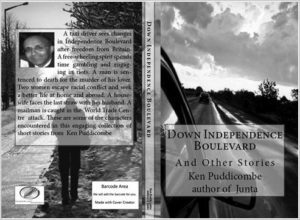Preserving our literary heritage
by Petamber Persaud
 The book Down Independence Boulevard and Other Stories is an important addition to the country’s literature because it focuses mainly on the push/pull factors fashioning internal migration with some attention paid to the pull/push factors of external migration and the disillusionment of returning home, all fascinatingly rendered in sixteen linked stories set in Guyana and North America but mainly in Guyana, during the ugly 1960s, from where all the main characters originate, some firstly migrating to safer locations in order to escape from racial animosity, racial discrimination and racial conflagration while others who are unable to deal with those curses, end up in the Diaspora to face similar curses in different guises, forcing at least one man to return to his birthplace where he has invested new monies (in a new building) to make a new start but is disillusioned on discovering he is deceived and cheated out of his investment and dream by a sister (and her husband) whose action is influenced by a society darkened by despotism and corruption.
The book Down Independence Boulevard and Other Stories is an important addition to the country’s literature because it focuses mainly on the push/pull factors fashioning internal migration with some attention paid to the pull/push factors of external migration and the disillusionment of returning home, all fascinatingly rendered in sixteen linked stories set in Guyana and North America but mainly in Guyana, during the ugly 1960s, from where all the main characters originate, some firstly migrating to safer locations in order to escape from racial animosity, racial discrimination and racial conflagration while others who are unable to deal with those curses, end up in the Diaspora to face similar curses in different guises, forcing at least one man to return to his birthplace where he has invested new monies (in a new building) to make a new start but is disillusioned on discovering he is deceived and cheated out of his investment and dream by a sister (and her husband) whose action is influenced by a society darkened by despotism and corruption.
However, not all of the stories are about racial disintegration; some are about universal theme of man/woman relationship told in a different tone, adding some humour (dark humour) and balance to the book saddled with sadness, offering little or no redemption. For instance, in ‘Why men leave’, set on Independence Day, two men – Jack, the taxi-driver and Ram, the jailer – conspire to liberate themselves from their nagging/dominating wives by flying out of the country simultaneously, to disappear without a trace. In ‘the last straw’, a woman takes revenge on her husband (and his family who treats her like a slave) a meticulous man who is proud of his moustache and appearance, by cutting off the right handlebar of his moustache, putting it in his lunch kit and then moving out.
Down Independence Boulevard and Other Stories is a sad book where characters habour hopes of seeing a better Guyana, devoid of race baiting and racial incitement but time and again these hopes are tested and dashed when challenged by events like the Black Friday strikes and riots of 1962 and the Wismar Massacre of May 1964.
Early stories like ‘Black Friday’ and ‘Sounds in the Night’ set the tone of the collection. In ‘Black Friday’, Old Man Augusto Dias loses everything even the opportunity to return to his ancestral home, Madeira, forcing his descendants take refuge in the Diaspora. This first story also introduces two other main characters Ecliffe Van Sertima and Ian Veira protesting against the Government and eventually taking refuge in the Diaspora.
‘Sounds in the Night’ paints the harrowing story of the Wismar Massacre. Lata and her husband, Rahim, recount their personal horror (and the horror of fellow Indians) starting on Sunday May 24, 1964, and how with the help of a Black family, they manage to escape on a refugee boat to Georgetown eventually making Independence Boulevard their home.
In ‘A House is not a Home’, a mixed race couple, Muniram and Cassandra, having fled from Endeavour – a predominately Indian village – are now contemplating taking refuge in Buxton, a predominately Black village or moving to the Diaspora but met with opposition from Rahim who was adamant about leaving his home or his country.
The title story ‘Down Independence Boulevard’ displays two links in the collection – the road from which all the main characters ‘originated’ – and the taxi driver, Jack Yusuff who turns up in many of the story, sometimes late.
The collection closes with ‘Eulogy’ and ‘You can never go home’. In ‘Eulogy’, set in Canada, Ian watches a DVD he has paid to be made of some of his colleagues he has managed to get together in order to celebrate his death. After the viewing, Ian walks out into heavily falling snow and heads for a lake in the park…. In ‘You can never go home’, Cassandra buys her husband, Muniram, a one-way ticket to Guyana where he is disillusioned on discovering that the house he has sent money to his sister to build was just a photograph of somebody else’s.
The linked stories sustained interest throughout the reading through suspense, delve use of language and attention to details. Moreover, it is useful to note that writing from afar allows the writer more freedom to recreate the past, filling out missing pieces in our history.
Down Independence Boulevard and Other Stories coming shortly after his two novels, Racing with the Rain and Junta, solidifies the author’s position as a convincing and credible writer of historical fiction.
Responses to this author telephone (592) 226-0065 or email: oraltradition2002@yahoo.com
What’s happening:
Check out Guyana Book Foundation, 66 New Garden & Anaira Streets, ‘Matching Fund Project’ between May 2 and July 20, 2018, for all levels of books at concessionary price. For further information, please call 227-4942. Guyana Times Sunday Magazine)



